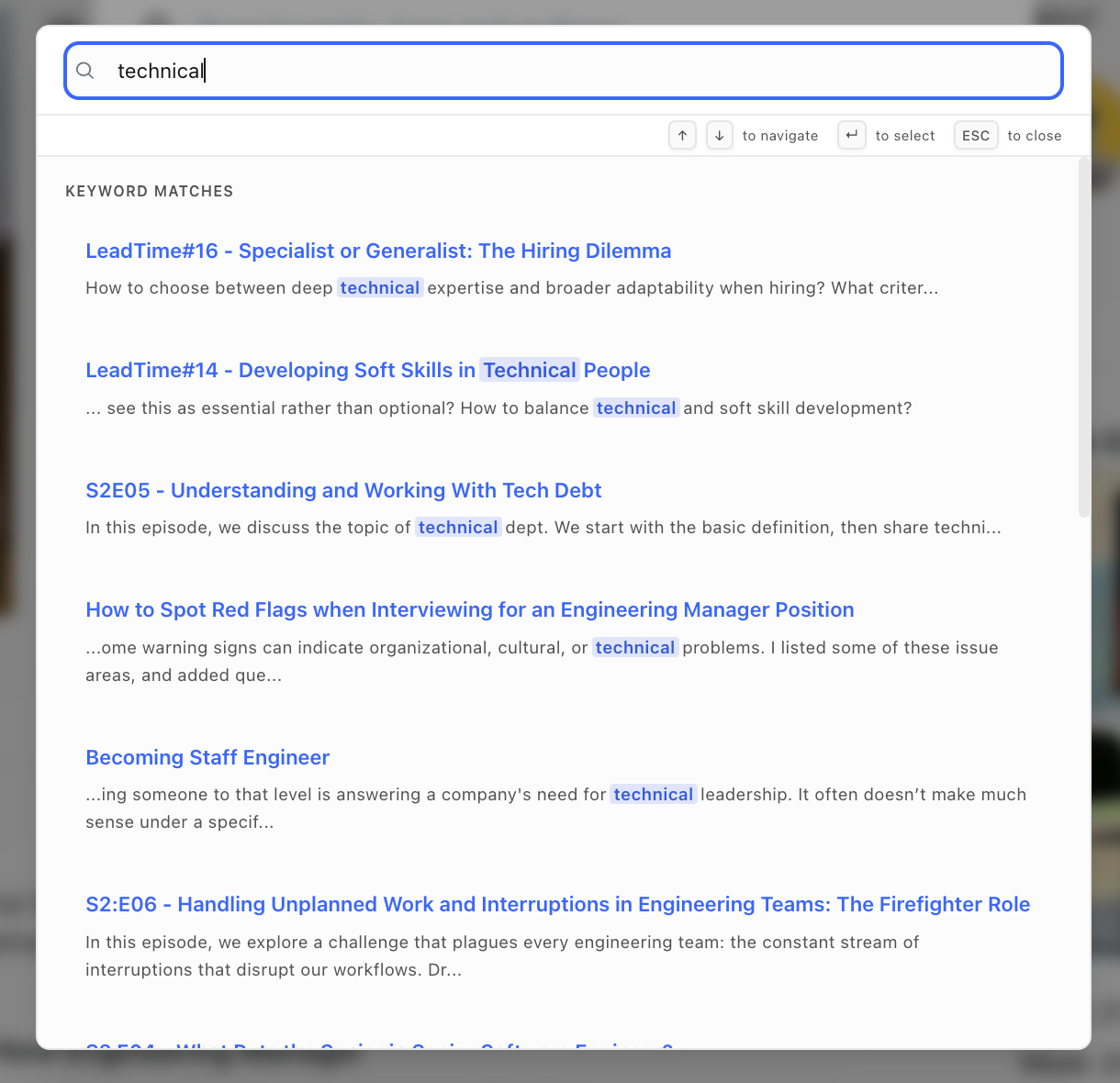Week 23, 2025 - Search and Burnout

This week in my Engineering Manager Challenges newsletter, I wrote my approach to building a platform team. It’s the twentieth week I’ve been publishing on Substack, and so far, I’m okay with the results: 127 subscribers with a roughly 50% open rate. I’m starting to run out of EM challenges, so hit reply to this mail if you have an idea for me to cover!
I have engineering leadership content on this blog, Substack, and the shared Retrospective Podcast with Jeremy. While my site provides links to all of them, I wanted to have a unified search functionality that indexes the contents of the three sites.
Enter Meilisearch, a fast, open-source engine that I replaced Ghost’s native one with. I wrote two simple Node sync scripts to import all the contents from RSS and the Ghost APIs, and with the help of Fanyang Meng’s ghost-meilisearch, wired it into the header of my blog. Now, if you click on the 🔍 icon, you’ll receive this interface, returning results from all three sites:

It’s not perfect, the experience falls apart on mobile, and I can probably further optimize the search functionality too, but it’s a good start.
🤔 Articles that made me think
2025 CTO Craft Compensation Survey Report
The biggest surprise is that despite all the radical changes in the industry, from AI to the focus on efficiency, there’s not much that has changed from 2024. An interesting case highlights a shift: a C-level recruitment in Paris revealed the city is falling behind Western European compensation levels. This VC-backed SaaS company reported paying +20% more in Berlin and Amsterdam, and even Barcelona now commands +10% over Paris. I suspect Lisbon is next.
On things that haven’t changed: still two-thirds of respondents cite “Lack of faith in Leadership/strategy” as their reason to leave in the next 6 months, and “Culture” and “Work life balance” are still top reasons to stay. Compensation is a weak third in both areas.
Finally, just like last year, more than half of the responders work in a hybrid setting, only 7% reporting being full-time in an office. Both slightly increased from last year’s 50% and 2%, respectively, making fully remote positions drop from 48% to 39%. Not measured in the survey (yet?), but in 2025, more than 200 companies in the UK adopted a four-day workweek setup, the tech industry being one of the early adopters, increasing their hiring potential in a still challenging job market.
How Tech Workers Feel Now
Another survey result, this time from Lenny’s product-focused newsletter. While only a minority of the responders work in engineering, I can’t imagine the difference would be radical in our sector. Two highlights caught my eye because they perfectly fit the picture of the current high-pressure era:
- 4 out of 5 tech workers reported some level of burnout. The AI-hype and the market pressure make companies quickly shift their strategies around. The 2024 DORA Report found that the highest contributor to burnout is exactly this: frequently changing organizational priorities. This must be one of the highest contributing factors to what the survey is measuring.
- 40% of respondents found their managers ineffective. In search of more efficiency, many organizations are doubling down on hands-on individual contribution, slashing managerial layers, merging teams, and increasingly requiring managers to code. This means managers are overworked, have to oversee bigger teams under higher pressure, deprioritize critical long-term team health and individual support tasks, all under the looming danger of losing their jobs. No wonder these impact their efficacy!
All these make me say the pendulum is about to swing back, and we’ll be moving towards an era of skilled hands-off managers who can focus full-time on building high-performing teams with engaged individuals delivering results aligned with business goals.
Purposeful Vulnerability
The difference between being vulnerable and sharing too much information is nicely summarized in this post. Sharing something from my career, a blunder that I learned from, is a powerful approach for me to build trust, encourage people, and build a safe-to-fail culture. However, I never thought intentionally about this, and the article is a good reminder of avoiding oversharing.
Vibe Coding in Early-Stage Startups
This is a genius angle, explaining that vibe coding is primarily about quick prototyping (and, by implication, shortening the feedback loop of information gathering, idea validation, etc.). Its impact on lean product development will be (is?) much bigger than on classical software engineering.
That’s it for today, be a bit vulnerable this weekend,
Péter